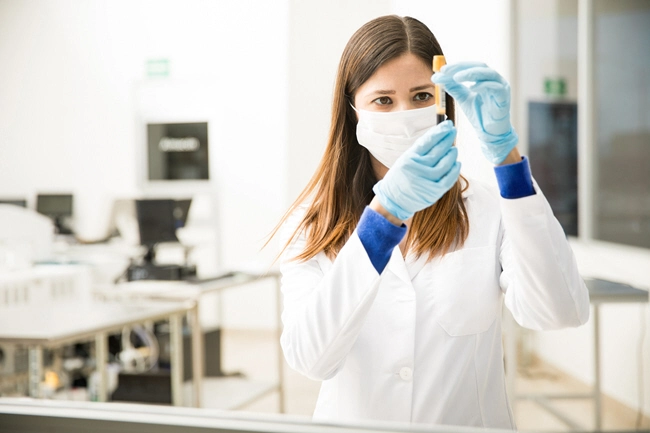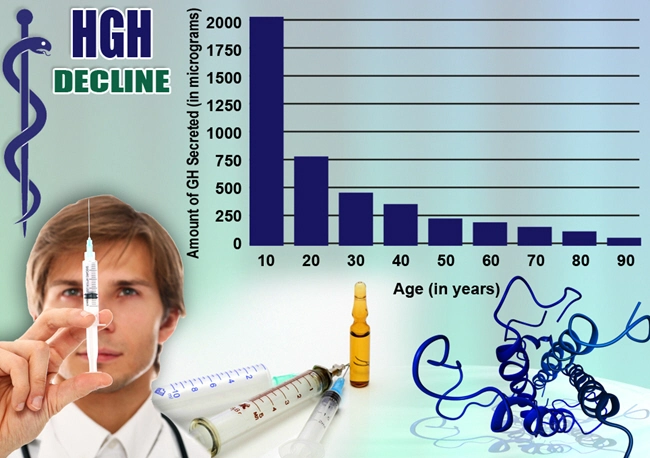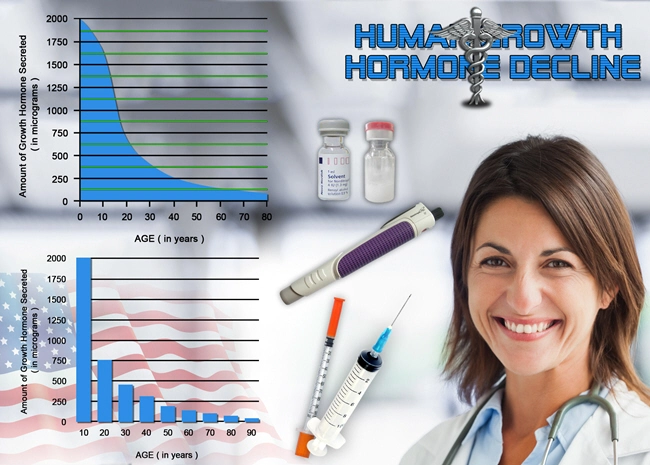
Hormone Replacement Therapy
Nutropin
Nutropin is produced by Genentech using recombinant DNA technology and has the same amino acid sequence as human growth hormone produced naturally in the human body. Recombinant growth hormone was cloned by Genentech scientists in 1979.
ABOUT ADULT GROWTH HORMONE DEFICIENCY
Growth hormone (hGH or GH) doesn't just contribute to physical growth in children. Adults need GH, too. In adults, GH is essential to the maintenance of healthy body composition and metabolism. When an adults body is unable to produce enough GH, he or she is said to have adult GH deficiency (AGHD).
Some people with adult growth hormone (hGH or GH) deficiency were not GH-deficient as children. These people are said to have adult-onset GH deficiency.
The usual cause of adult-onset GH deficiency is damage to the pituitary gland, which is responsible for secreting GH. This damage is most commonly caused by one or more tumors in and around the pituitary. Such a tumor may compress the gland, or the damage may occur when the tumor is removed. The pituitary gland may also be damaged by infection, blood vessel disease, severe head injury, or radiation treatment for tumors of the head or neck. .
Disease Education:
Growth hormone deficiency, GHD, is a pituitary disorder resulting in short stature and other physical ailments. GHD occurs when the production of growth hormone, secreted by the pituitary gland, is disrupted. Since growth hormone plays a critical role in stimulating body growth and development, and is involved in the production of muscle protein and in the break down of fats, a decrease in the hormone affects numerous body processes.
Turner syndrome affects approximately one in 2,500 female, live births. Turner syndrome is a chromosomal disorder that affects females exclusively and is characterized, in part, by short stature and ovarian dysfunction. It is caused by the absence of all or part of one of the X chromosomes.
Chronic renal insufficiency, CRI, affects about 3,000 children in the United States. It manifests through a gradual and progressive loss of the ability of the kidneys to excrete wastes, concentrate urine, and conserve electrolytes. Kidney transplants can help a child start growing normally again, but most children do not make up the growth lost prior to transplantation.
Safety:
Growth hormone should not be initiated to treat patients with acute critical illness due to complications following open heart or abdominal surgery, multiple accidental trauma or to patients having acute respiratory failure.
Growth Hormone should not be used for growth promotion in pediatric patients with closed epiphyses.
Growth Hormone should not be used in patients with active neoplasia. Growth Hormone therapy should be discontinued if evidence of neoplasia develops. Patients with a history of an intracranial lesion should be examined frequently for progression or recurrence of the lesion.
Intracranial hypertension (IH) with papilledema, visual changes, headache, nausea, and/or vomiting has been reported in a small number of patients treated with Growth Hormone. Funduscopic examination of patients is recommended at the initiation and periodically during Growth Hormone therapy. Patients with CRI or Turner's Syndrome may be at increased risk for development of IH.
Growth Hormone may reduce insulin sensitivity, particularly in obese individuals, patients should be observed for evidence of glucose intolerance. For patients with diabetes mellitus, the insulin dose may require adjustment when Growth Hormone therapy is instituted.
Experience with prolonged Growth Hormone treatment in adults is limited.
Adverse events frequently reported in adult patients were edema (41%), arthralgias and other joint disorders (27%). Thirty-five per cent of childhood-onset adult Growth Hormone deficient subjects treated with Growth Hormone 0.025 mg/kg/day for 2 years had supraphysiologic levels of insulin-like growth factor-I (IGF-I) at some time during the study, which may carry unknown risks. During therapy, dosage should be decreased if required by the occurrence of side effects or excessive IGF-I levels.
Patients being treated with Growth Hormone (GH) should be informed of the potential benefits and risks associated with Growth Hormone therapy.
For additional product Information visit: http://www.nutropin.com
Number of words: 657
Contact Us Today For A Free Consultation
Dear Patient,
Once you have completing the above contact form, for security purposes and confirmation, please confirm your information by calling us.
Please call now: 1-800-380-5339.
Welcoming You To Our Clinic, Professor Tom Henderson.

- Injectable HGH Prescriptions: Blood Testing Centers in Philadelphia, Pennsylvania [Last Updated On: February 26th, 2024] [Originally Added On: March 3rd, 2019]
- Hgh Replacement [Last Updated On: December 21st, 2024] [Originally Added On: March 14th, 2020]
- Hgh Therapy [Last Updated On: December 22nd, 2024] [Originally Added On: March 15th, 2020]
- Anti-ageing Clinics Distribute Human Growth Hormone [Last Updated On: December 25th, 2024] [Originally Added On: March 16th, 2020]
- Hgh In Forefront To Remain Young [Last Updated On: November 25th, 2024] [Originally Added On: March 18th, 2020]
- Benefits Of Hgh: Thierry Hertoghe [Last Updated On: December 23rd, 2024] [Originally Added On: April 23rd, 2020]
- Getting Started With An Hgh Program [Last Updated On: December 24th, 2024] [Originally Added On: April 25th, 2020]
- Hgh Releasers [Last Updated On: December 25th, 2024] [Originally Added On: April 26th, 2020]
- What dietary considerations should I make while on HRT, hormone replacement therapy? [Last Updated On: December 20th, 2024] [Originally Added On: May 1st, 2020]
- Hgh Dosage [Last Updated On: April 2nd, 2024] [Originally Added On: May 5th, 2020]
- Hgh Deficiency [Last Updated On: December 23rd, 2024] [Originally Added On: May 6th, 2020]
- Hgh Products Genotropin Humantrope Nutropin Saizen Serostim Omnitrope [Last Updated On: November 25th, 2024] [Originally Added On: May 8th, 2020]
- What Is Injectable Hgh Human Growth Hormone? [Last Updated On: December 22nd, 2024] [Originally Added On: May 9th, 2020]
- Introduction To Human Growth Hormone HGH [Last Updated On: December 24th, 2024] [Originally Added On: May 10th, 2020]
- Omnitrope Injections for the Treatment of HGH Deficiency [Last Updated On: July 7th, 2024] [Originally Added On: May 6th, 2021]
- Sleep To Amplify Human Growth Hormone Levels [Last Updated On: July 6th, 2024] [Originally Added On: May 27th, 2021]
- Buying Hgh Hormone Human Growth Hormone [Last Updated On: July 19th, 2024] [Originally Added On: February 22nd, 2022]
- Hgh For Menopause [Last Updated On: September 27th, 2024] [Originally Added On: February 23rd, 2022]
- Your HGH Levels [Last Updated On: September 4th, 2024] [Originally Added On: February 24th, 2022]
- Related Glossary of Terms [Last Updated On: October 14th, 2024] [Originally Added On: February 25th, 2022]
- Hgh Facts - Information About Growth Hormone [Last Updated On: July 20th, 2024] [Originally Added On: February 26th, 2022]
- Hgh Sports And Baseball [Last Updated On: July 21st, 2024] [Originally Added On: February 27th, 2022]
- Us Olympic Committee And Talk Of Hgh [Last Updated On: September 29th, 2024] [Originally Added On: February 28th, 2022]
- Braves' Schafer Talks About His Suspension Over Hgh [Last Updated On: July 22nd, 2024] [Originally Added On: March 1st, 2022]
- Hgh Scams: Different Hgh Scams And Things To Watch For Online [Last Updated On: July 26th, 2024] [Originally Added On: March 2nd, 2022]
- Nordiflex HGH Injection Device Information [Last Updated On: September 30th, 2024] [Originally Added On: March 3rd, 2022]
- Genotropin Hgh Detailed Description [Last Updated On: October 15th, 2024] [Originally Added On: March 4th, 2022]
- Saizen Hgh Detailed Description [Last Updated On: October 17th, 2024] [Originally Added On: March 6th, 2022]
- Genotropin HGH: Human Growth Hormone Product [Last Updated On: July 23rd, 2024] [Originally Added On: March 6th, 2022]
- Omnitrope Hgh: Human Growth Hormone Product Called Omnitrope. [Last Updated On: October 5th, 2024] [Originally Added On: March 7th, 2022]
- Nutropin Hgh Detailed Description [Last Updated On: October 3rd, 2024] [Originally Added On: March 8th, 2022]
- Saizen Hgh: Injectable Hgh Product [Last Updated On: July 24th, 2024] [Originally Added On: March 9th, 2022]
- Hgh Product Serostim [Last Updated On: July 25th, 2024] [Originally Added On: March 11th, 2022]
- HGH Scams (HGH Supplements) [Last Updated On: November 12th, 2024] [Originally Added On: March 20th, 2022]
- Side Effects Of HGH [Last Updated On: August 2nd, 2024] [Originally Added On: March 21st, 2022]
- Testimonial: Walter’s HGH Story [Last Updated On: August 28th, 2024] [Originally Added On: June 4th, 2022]
- HGH Is the “God Particle” [Last Updated On: August 17th, 2024] [Originally Added On: July 26th, 2022]
- Low testosterone in men might increase the risk of severe COVID [Last Updated On: September 20th, 2024] [Originally Added On: September 6th, 2022]
- Can I Reverse the Aging Process with HGH? [Last Updated On: August 19th, 2024] [Originally Added On: September 21st, 2022]
- A new study confirms: Testosterone Replacement Therapy is safe! [Last Updated On: September 3rd, 2024] [Originally Added On: October 2nd, 2022]
- HGH Therapy – How Can I Know Who Is Legitimate? [Last Updated On: June 29th, 2024] [Originally Added On: January 10th, 2023]
- The Evolution of Testosterone Replacement Therapy for men with Prostate Cancer [Last Updated On: June 24th, 2024] [Originally Added On: January 12th, 2023]
- Nine Hormones that Can Impact Your Weight and How to Promote Hormone Balance [Last Updated On: June 28th, 2024] [Originally Added On: January 26th, 2023]
- Get Tested for Hormone Levels, even if You Have No Symptoms [Last Updated On: August 29th, 2024] [Originally Added On: March 17th, 2023]
- Can Head Injuries Cause HGH Deficiency? [Last Updated On: August 26th, 2024] [Originally Added On: May 17th, 2023]
- Mountain Biker Thought his Life Was Over [Last Updated On: August 15th, 2024] [Originally Added On: May 25th, 2023]
- Do HGH Booster Supplements Work Faster Than Prescriptions? [Last Updated On: August 31st, 2024] [Originally Added On: June 3rd, 2023]
- HGH and It’s Effects on Other Hormones [Last Updated On: October 26th, 2024] [Originally Added On: June 10th, 2023]
- Maintaining a Proper Medication Schedule [Last Updated On: November 24th, 2024] [Originally Added On: August 23rd, 2023]
- What is the History of the Discovery of HGH? [Last Updated On: October 21st, 2024] [Originally Added On: September 17th, 2023]
- Don’t Let Fear Stop You From Fixing Your Hormones [Last Updated On: October 22nd, 2024] [Originally Added On: September 22nd, 2023]









